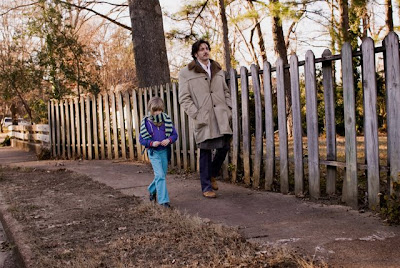
Bookmark this on Delicious
Print Page
While the rough seas of the film festival circuit can be hard to navigate as many award-winning works become the equivalent of “indie overboard” without the life jacket of a distributor, a limited theatrical run or release on disc—Kirt Gunn’s fiercely independent offering Lovely By Surprise managed to stay afloat.

In fact, it did much more than tread water for two years following its Seattle Film Festival New American Cinema Special Jury Prize accolade since it was buoyed by a positive online word-of-mouth campaign.

With screeners making the rounds of online critics (including yours truly) and further success in festivals in the UK and elsewhere, debut filmmaker Gunn’s Surprise struck a chord with like-minded viewers with its tale of a neurotic novelist (Carrie Preston) plagued by uncertainty when her mentor and former professor (Austin Pendleton) suggests that the solution to her writer’s block would come from killing off one of the main characters in the book she’s struggling to complete.

And as such, Surprise has easily drawn comparisons to both screenwriter Charlie Kaufman’s Adaptation (helmed by Spike Jonze) as well as Zach Helm’s Stranger than Fiction (directed by Marc Forster) for its emphasis on a solipsistic writer in the former and the complication of killing a main character in the latter especially since actor Michael Chermus’ protagonist Humpkin has been written by Preston’s Marian with awareness that he’s a character in a world she’s created.
However, instead of feeling something the way we did for Will Ferrell’s tragicomic tax man in Stranger than Fiction-- it’s hard to feel that moved by the childish world that Marian has constructed for her novel as the admittedly likable Humpkin exists for a majority in the film living on a land-locked boat with his brother Mopekey (a wasted Dallas Roberts) -- both compulsively clad in their underwear—who survive on cereal in a purely absurdist existence until Humpkin escapes.

It’s one of three interrelated yet vastly different narratives--some of indecipherable setting aside from the truly imaginative based world of the fictitious creation-- as Marian’s appears to occur in present day but the most engrossing storyline resembles the 1970s (a.k.a. “the past” as I instantly wrote in my notes to keep things straight).

However, the heart of Gunn’s film can be found in the tragic storyline of the widowed Bob (played by an emotive, understated Reg Rogers) as a struggling car dealer who ends up talking prospective buyers out of purchases with questions of life and death, informing them that a car won’t make them happy until ultimately his empathetic boss and friend Dave (Richard Masur) has no choice but to take away Bob’s company car which will be returned following his first successful sale.

It doesn’t take very long for us to realize that the loss of Bob’s wife was sudden and shocking considering the kids-gloves treatment of him at work and the way he always seems distracted, forgetting to go to school to pick up his daughter Mimi (Lena Lamur) who has remained silent since her mother’s death.

Yet, even this storyline which is bolstered by the astute turn by Rogers fails to involve us on the level it should’ve as the movie is bogged down by the uneven and uneasy way the other storylines are woven together which results in a somewhat unexpected yet not fully emotionally earned finale (hinted at in a few earlier shots).
Granted, the conclusion ties it all together in a way that makes more sense the further you get away from the film when you can piece it together. And in doing so, it helps you appreciate the work on a greater level and in particular the character of Marian who had worn on our nerves throughout beginning with her opening scene as she tries to negotiate the enormity of writing a novel with her own self-doubt.

However, I couldn’t help but wish that for the film’s core-- Gunn had stayed away from the Gondry meets Bunuel meets Godard absurdist approach for the setting of Marian’s novel in a way that made it slightly more grounded and less ridiculous so that we could at least buy into her purported talent and therefore care about her struggles genuinely for the length of one hundred and forty minutes.
Beautifully shot and chopped by cinematographer Steve Yedlin and editor Jim Helton with a terrific soundtrack (including the music of Magnetic Fields' Stephin Merritt)—Gunn’s polished production makes its way to DVD to own on 7/7/09. Of course, it’s always inspiring to see a filmmaker remain devoted to his own artistic process but the film’s enormous potential was diminished by its preoccupation with eccentricity instead of emotion.
While Lovely By Surprise works so much better when dealing with what appears to be the narratives that are set in the present and the past as opposed to the eye-rolling imaginary one which should’ve been either axed altogether or rewritten—had Gunn managed to find precisely the right third fictitious one to make it swim even lovelier as opposed to the times when (at least for me) it sunk—I feel like it would’ve been an even greater Surprise all-around.

Still, boasting great promise from an obviously thoughtful and intelligent new cinematic voice—I’m very much looking forward to seeing what Gunn will do next, now that he can jump out of the safe yet constricting raft of a first film and move into uncharted waters with sharper focus.
Text ©2009, Film Intuition, LLC; All Rights Reserved. http://www.filmintuition.com
Unauthorized Reproduction or Publication Elsewhere is Strictly Prohibited.